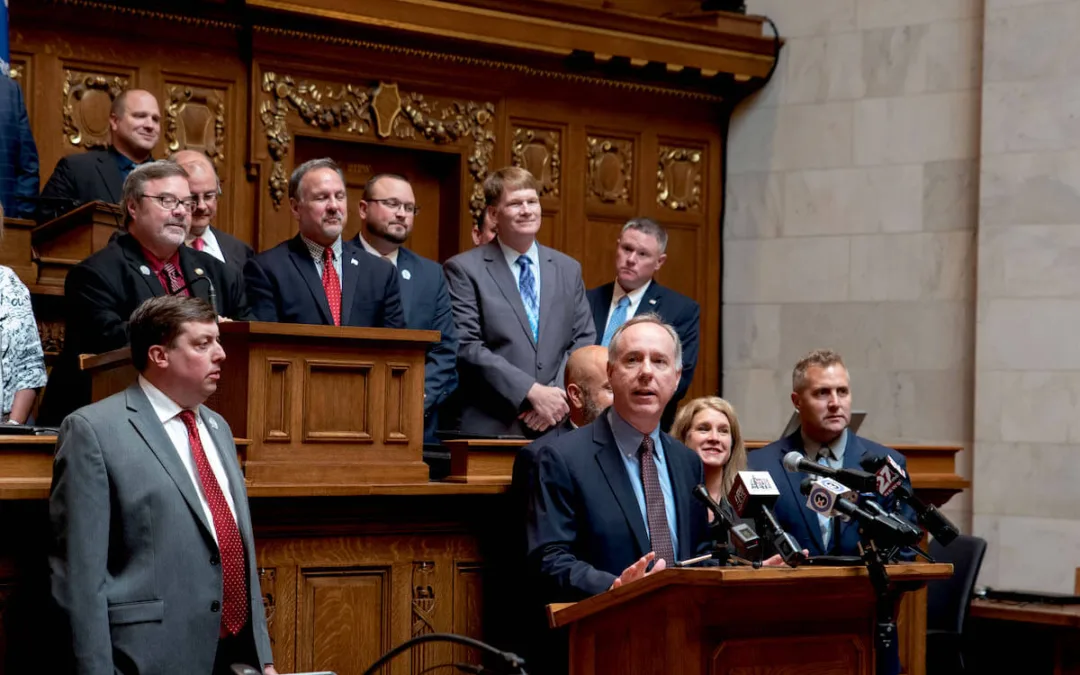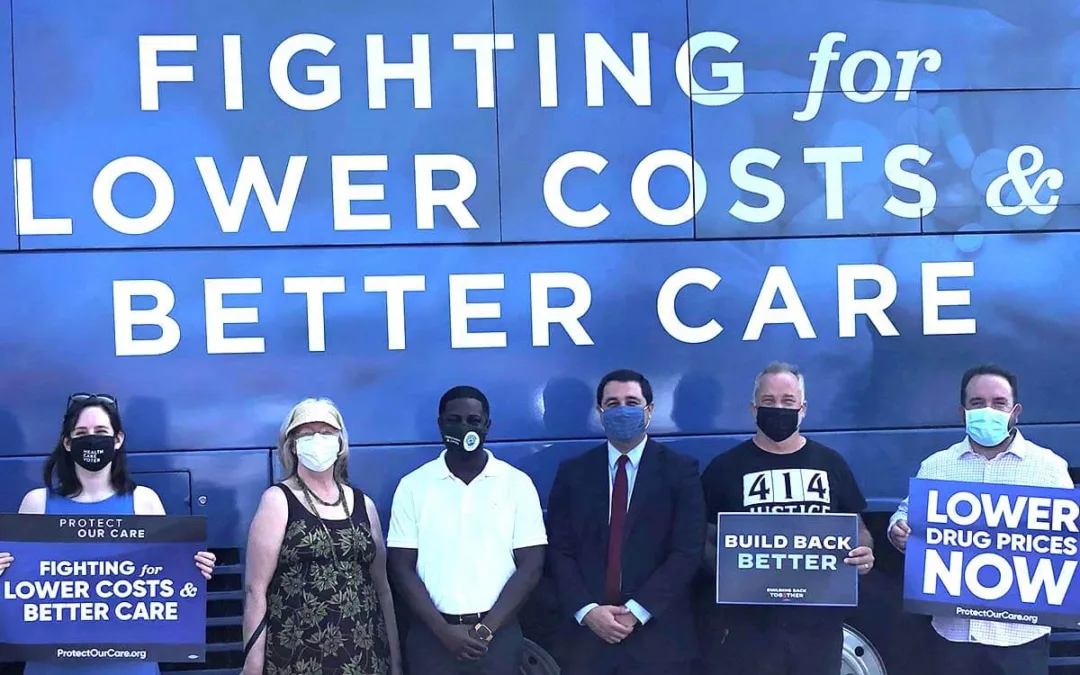
#image_title
In an op-ed, the state manager for the Main Street Alliance, argues the big lobby that claims to be pro-business in Wisconsin is bad for mom-and-pop shops.
On Small Business Saturday, it’s a day not only to shop small and local but also to reflect on how we can better support small businesses and our local economy for the long term. Here in Wisconsin, from Viroqua to Green Bay to Milwaukee, shoppers took to the streets on Saturday to support local small businesses who have been through so much over the past year.
For decades, influential corporate players have perpetrated a kind of identity theft against the country’s small businesses. These players persuaded lawmakers, and much of the public, that businesses large and small shared common interests expressed through what they deemed a “business-friendly agenda.” In Wisconsin, that takes the form of Wisconsin Manufacturers and Commerce (WMC).
WMC is a partisan political organization pretending to be a business organization. It will make arguments based on what helps them make its political argument instead of where the facts lead them or what’s best for business. Over this past year, WMC has blamed enhanced unemployment insurance, the child tax credit, vaccine mandates, and a whole host of other issues for the workforce challenges our country is facing. The facts about those issues, backed up by financial institutions such as Forbes, JP Morgan, Moody’s, and others, have proved this to be false. WMC is making things up.
Instead of community investment and entrepreneurial support, WMC lobbyists pushed an agenda focused on tax breaks, deregulation, and privatization. They have fought any regulation of PFAS every step of the way. Our relationship with small businesses here at Main Street Alliance shows that small businesses have distinct and unique needs. They thrive when their communities thrive, unlike big corporations who extract from communities. Many of our members served charitable meals (Chef Dave Heide helped feed over 70,000 folks during the pandemic) or encouraged folks to get vaccinated (Chef Patrick DePula hosted vaccine clinics for folks in the food service industry at Salvatore’s Tomato Pies).
WMC did not encourage folks to get vaccinated. Not even once, except to demand the state let manufacturing employees get vaccinated in priority groups in March. Since then, WMC has fought tooth and nail against the Biden administration’s vaccine and testing mandate for large employers.
This is unacceptable, especially when the single best thing we can do to help small businesses is to get vaccinated.
COVID pummeled small businesses already hamstrung by decades of neoliberal policy and a long history of structural racism. Economic ideas gained steam throughout the 1970s and 1980s, with policy changes emphasizing growth over competition and attacks on labor unions and regulation. These principles have ultimately contributed to widespread inequality.
Many people believe that small business owners and entrepreneurs have a mythic quality: the go-getter, do-it-alone types who want to be their own bosses. Most small business owners know how interdependent we are and how much community support is needed to thrive. When businesses can’t get that support, no amount of tenacity will save you.
Before the pandemic, the government needed to level the playing field for small businesses against ever–consolidating corporations. During the pandemic, the immediate financial support only a government can provide at scale was evident. Overall, the PPP loan program reached over 75% of small businesses nationwide. As we try to move forward, the financial needs remain. Small businesses owners understand this. Government has a role in leveling the playing field.
In Wisconsin, Gov. Tony Evers and his administration have provided over $700 million in support for small business in the form of grants from the Wisconsin Economic Development Corp. and Department of Administration. Many businesses across our state would not have survived if not for this support. Furthermore, when there have been issues with grant programs either in design or implementation the Governor’s team has been eager to work with small business owners to address them. That’s leadership. And that’s why Wisconsin has had among the fewest small business failures of any state in the country.
Entrepreneurship is heralded as a path to opportunity. Prior to the pandemic, the fastest-growing segment of entrepreneurs were Black women. Yet, through government efforts to create an equal economy—with a specific commitment to dismantling systemic racism—entrepreneurship can contribute to generational wealth, financial security, and prosperous local economies. With 2.5 million women leaving the workforce during the pandemic, and women-owned businesses more heavily impacted than their male counterparts, decades of gains in economic power were erased overnight.
RELATED: Paid Leave, Universal Child Care Help Employers and Employees Alike, WI Business Owners Say
Only the government can make the public investments at scale and set the market rules necessary to sustain a thriving small business economy. These investments cannot be solely left to philanthropy, which does not have the resources and policy tools to generalize benefits, nor to the private market as currently structured, which creates lopsided incentives for monopolization. Moreover, for effective delivery at the scale necessary, it must be done through an open, democratic process—one only the government can provide.
The investment proposed in the Biden administration’s Build Back Better plan would create an environment that supports business growth—supporting both entrepreneurs and their employees in the long run. At the state and national level, these investments would allow businesses to compete on their services, not their benefits. Benefits like health care, child care, paid leave, and more are benefits that the market does not make available and affordable to small business owners or our employees, making it harder to hire and retain staff. This will require more revenue to pay for this, and we should look to the wealthiest and largest corporations to pay their fair share so that all can benefit. It has been the wealthiest among us who have benefited from an inequitable economy and unfair market practices, so it is only fair that they participate in the fix.
Again, the Build Back Better Act brings many of these ideas together. It offers a reframing of how to support small businesses. With a rejection of neoliberalism, trickle-down economics, and corporate loopholes, a small business-centered economy looks like investment from the ground up. It provides a stable footing from which to launch and grow businesses. It reduces the risk for entrepreneurs to innovate with robust safety nets.
We want to thank Sen. Tammy Baldwin and Reps. Mark Pocan, Ron Kind, and Gwen Moore for their leadership as we head towards a vote in the Senate on the Build Back Better plan. You can take action in support of Build Back Better here.
There is no more critical time for this investment, as our nation recovers from the pandemic and shifts the public perception of the economy and local businesses’ role.

Editorial: Democracy Only Works With Trust. Attacks on Election Officials Endanger That.
Republicans are trying to tear down a system they built to make the fourth change in 15 years on who controls the rules on voting. Wisconsin is at...

How I Learned to Stop Worrying and Appreciate the Deer Hunt
UpNorthNews reporter Julian Emerson recounts his wide range of experiences with Wisconsin's gun deer hunting season. On a cloudy November morning...

Op-Ed: ‘You Don’t Speak for Me,’ Small Business Owner Tells Lobbyists Opposing Biden’s Agenda
Becky Cooper, owner of Bounce Milwaukee, lays out her support for human-focused components of Biden's agenda. I am a small business owner. I have...

David Crowley: Communities Need Help to Achieve Healthcare Goals
Milwaukee County Executive David Crowley writes that President Biden's Build Back Better agenda is critical to helping communities like Milwaukee...



